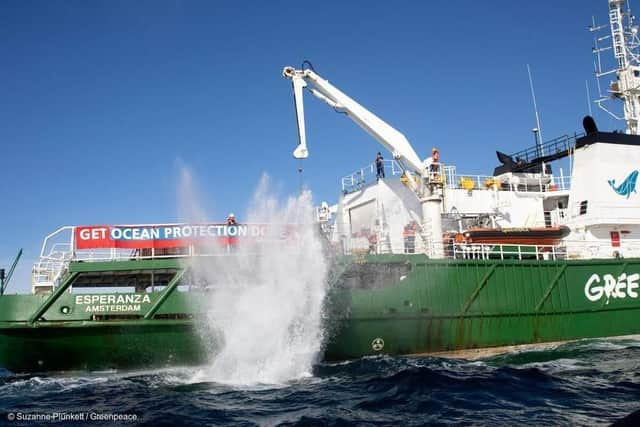Campaigners to start dropping boulders into sea in new bid to stop industrial fishing in 'protected' area
Greenpeace UK is sending its vessel Arctic Sunrise south west in the coming weeks to begin a “barrier” at South West Deeps, 200 miles off the Land’s End peninsula.
The organisation said it is pushing ahead with its third boulder drop - having previously dumped them on “marine protected areas” off Brighton and Dogger Bank, 80 miles off Yorkshire’s
Advertisement
Hide AdAdvertisement
Hide AdDespite the name, marine protected areas are still open to large-scale trawlers that drag nets along the bottom, destroying much of what is in their path.


Greenpeace may have been emboldened after a Judge criticised the Marine Management Organisation (MMO) for taking a private prosecution against them for dropping boulders off Brighton in a similar operation to protect marine life.
In January Judge Edward Bindloss said the case was not in in the public interest and it “touched on the absurd” that it was taking place.
After his intervention, the MMO offered no evidence - sparking an angry response from the “voice for UK fishermen”, the York-based National Federation of Fishermen’s Orgnisations, who warned that it would send a signal to Greenpeace “to carry on their vigilantism”.
Advertisement
Hide AdAdvertisement
Hide AdAccording to Greenpeace, the South West Deeps is one of the most heavily fished marine protected areas in the UK.
Satellite data showed that between January 2021 and mid-July 2022, it was fished for nearly 19,000 hours by 110 boats. Over the same period bottom-trawlers spent more than 3,370 hours fishing there, it said. Over half were from France, followed by Spain, with just nine per cent from Britain.
In April, Environment Secretary George Eustice announced bottom trawling would be banned at four of the UK’s 76 protected zones, including Dogger Bank, with a ban under consideration at 13 more. Pat Venditti, Greenpeace UK’s executive director, described the barrier as a last resort.
“The future of the UK’s oceans is hanging in the balance, and we’re running out of time to save them from industrial fishing, habitat destruction and climate change,” Mr Venditti said.
Advertisement
Hide AdAdvertisement
Hide AdHe added: “The next prime minister should ban industrial fishing in marine protected areas by tweaking commercial fishing licences, to show they mean business on protecting nature and supporting fishing communities.”
It comes as the Government today launches a new five-year maritime security strategy, which includes taking a part in international efforts to map the entire ocean floor, using the expertise of the Taunton-based UK Hydrographic Office.
Transport Secretary Grant Shapps said: “Mankind has better maps of the surface of the moon and Mars than of our own ocean.
“To ensure the UK’s maritime security is based on informed and evidence-based decisions, we must build our knowledge of this dynamic ocean frontier.”
Advertisement
Hide AdAdvertisement
Hide AdThe Government said the new strategy includes tackling illegal fishing and polluting activities.
Under the strategy any illegal, unreported and unregulated fishing or environmental damage is considered a maritime security concern.
Comment Guidelines
National World encourages reader discussion on our stories. User feedback, insights and back-and-forth exchanges add a rich layer of context to reporting. Please review our Community Guidelines before commenting.